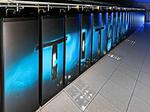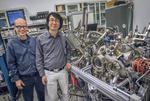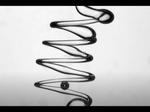Other
“A research team has demonstrated how light-emitting nanoparticles, developed at the U.S. Department of Energy’s Lawrence Berkeley National Laboratory (Berkeley Lab), can be used to see deep in living tissue. The specially designed nanoparticles can be excited by …

“A team led by scientists at the U.S. Department of Energy’s Lawrence Berkeley National Laboratory (Berkeley Lab) found a way to make a liquid-like state behave more like a solid, and then to reverse the process. They put …

“Before using quantum computers for scientific discovery, scientists need to first create the foundations for their computer languages. Imagine trying to use a computer that looks and acts like no computer you’ve ever seen. There is no keyboard. There …

“Berkeley Lab-led team discovers right mix of nanocrystals and light to activate unique laser properties in 5-micron spheres Researchers have found a way to convert nanoparticle-coated microscopic beads into lasers smaller than red blood cells. These microlasers, which convert infrared …

“Berkeley Lab-led research team simulates sliver of the universe to tackle subatomic-scale physics problem Experiments that measure the lifetime of neutrons reveal a perplexing and unresolved discrepancy. While this lifetime has been measured to a precision within 1 percent using …

“Measurements at Berkeley Lab’s Molecular Foundry reveal exotic spin properties that could lead to new form of data storage esearchers working at the Department of Energy’s Lawrence Berkeley National Laboratory (Berkeley Lab) coupled graphene, a monolayer form of …

“Optimizing lithium-sulfur battery electrolytes for long life. The Science In the future, lithium-sulfur (Li-S) rechargeable batteries could hold more energy and cost less than lithium-ion batteries if they can be made to last longer. A key challenge is preventing the …

“An international team of scientists has demonstrated a breakthrough in the design and function of nanoparticles that could make solar panels more efficient by converting light usually missed by solar cells into usable energy. The team, led by scientists at …

“Scientists from the Department of Energy’s Lawrence Berkeley National Laboratory (Berkeley Lab) have developed a way to print 3-D structures composed entirely of liquids. Using a modified 3-D printer, they injected threads of water into silicone oil — sculpting tubes …

“Berkeley Lab’s ‘farm of the future’ project marries microbiology and machine learning This farm in Arkansas may soon be the most scientifically advanced farm in the world. (Credit: Jay McEntire) There’s a farm in Arkansas growing soybeans, corn …
